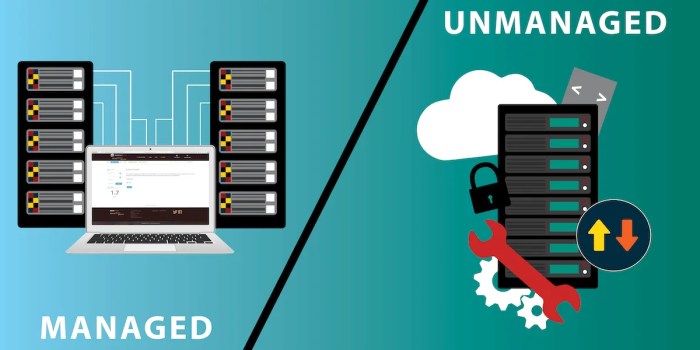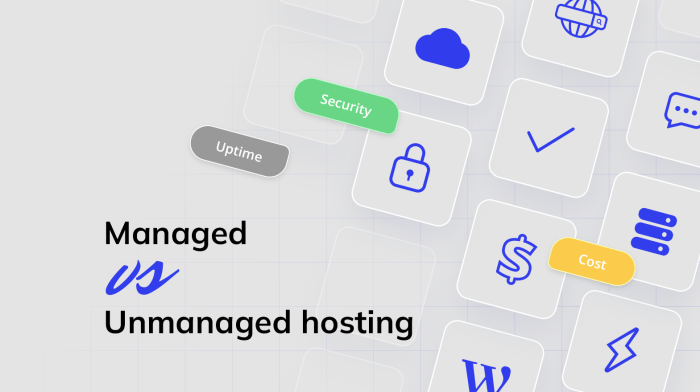Managed vs Unmanaged Server Hosting Explained: Key Differences and Considerations
When it comes to managed vs unmanaged server hosting, understanding the distinctions between the two can make a significant impact on your online presence. This guide delves into the nuances of both types of hosting, shedding light on their features, benefits, costs, security considerations, and scalability options.
Whether you're a seasoned website owner or just starting out, grasping the intricacies of managed and unmanaged server hosting is essential for making informed decisions for your online platform.
Managed vs Unmanaged Server Hosting
When it comes to server hosting, there are two main options to consider: managed and unmanaged. Each type offers a different level of control and support, catering to varying needs and preferences.
Managed Server Hosting
Managed server hosting is a type of hosting service where the hosting provider takes care of all the technical aspects of managing the server. This includes tasks such as server setup, maintenance, security updates, and technical support. With managed hosting, users can focus on their websites or applications without worrying about the backend server management.
Unmanaged Server Hosting
On the other hand, unmanaged server hosting puts the responsibility of server management entirely on the user. This means that users are in charge of setting up the server, installing software, configuring security measures, and handling any technical issues that may arise.
Unmanaged hosting is ideal for users who have the technical expertise and prefer full control over their server environment.
Key Differences
- Managed hosting offers convenience and peace of mind, as the provider handles all server management tasks, while unmanaged hosting gives users complete control and flexibility over their server.
- With managed hosting, users can rely on the provider's technical expertise and support, whereas with unmanaged hosting, users need to have their own technical knowledge or hire external help.
- Managed hosting is generally more expensive than unmanaged hosting due to the added services and support provided by the hosting provider.
- Unmanaged hosting is suitable for users who want to customize their server environment extensively, while managed hosting is better for those who prioritize ease of use and offload technical responsibilities.
Features of Managed Server Hosting
Managed server hosting offers a range of features that make it an attractive option for businesses looking to outsource their server management. Let's explore some key features and benefits of opting for managed server hosting.
24/7 Technical Support
Managed server hosting typically includes round-the-clock technical support from experts. This means you can rely on professional assistance to troubleshoot any issues that may arise with your server at any time of the day.
Proactive Monitoring and Maintenance
Providers of managed server hosting often offer proactive monitoring and regular maintenance of your server. This helps to identify and address potential problems before they escalate, ensuring optimal performance and reliability.
Security Updates and Patch Management
Managed server hosting services usually include security updates and patch management to protect your server from vulnerabilities and cyber threats. This helps to enhance the overall security of your server environment.
Backup and Disaster Recovery
Managed server hosting typically includes backup solutions and disaster recovery plans to safeguard your data in case of unexpected events. This ensures that your critical data is protected and can be quickly restored if needed.
Scalability and Resource Management
Managed server hosting providers offer scalability options and efficient resource management to accommodate your changing business needs. This allows you to easily scale up or down based on your requirements without worrying about server configurations.These features of managed server hosting make it an ideal choice for businesses that prioritize security, reliability, and performance, allowing them to focus on their core operations without the hassle of server management.
Features of Unmanaged Server Hosting
Unmanaged server hosting offers a different set of features compared to managed hosting. While it may not be suitable for everyone, unmanaged hosting provides benefits for users with specific technical skills and requirements.
Full Control over Server Configuration
Unmanaged server hosting gives users complete control over server configuration, allowing them to customize settings according to their specific needs. This level of control is ideal for users who are comfortable managing server operations independently.
Flexibility and Scalability
With unmanaged hosting, users have the flexibility to scale resources up or down based on their requirements. This means they can easily adjust server capacity, storage, and other parameters without relying on a provider for assistance.
Cost-Effective Solution
Unmanaged server hosting is generally more cost-effective than managed hosting since users are responsible for managing and maintaining the server themselves. This can result in significant cost savings for users who have the technical expertise to handle server administration.
No Restrictions on Software Installation
Unlike managed hosting, unmanaged hosting does not impose restrictions on software installations. Users have the freedom to install any software or applications they need, giving them more control over their server environment.
Hands-On Learning Experience
Choosing unmanaged server hosting can provide users with a valuable hands-on learning experience in server management and administration. This can be beneficial for individuals looking to enhance their technical skills and knowledge in server operations.
24/7 Technical Support
Although unmanaged hosting does not include the same level of support as managed hosting, users can still access technical support services on a 24/7 basis. This allows users to seek assistance when encountering technical issues or challenges while managing their server.
Cost Comparison
When it comes to choosing between managed and unmanaged server hosting, cost is a significant factor that can influence your decision. Let's take a closer look at how the costs compare between these two options.
Managed Server Hosting Costs
Managed server hosting typically comes at a higher price compared to unmanaged hosting. This is because with managed hosting, you are paying for the convenience of having the hosting provider take care of tasks such as server setup, maintenance, security updates, and technical support.
The cost of managed hosting can vary depending on the level of service and the resources allocated to your server.
Unmanaged Server Hosting Costs
On the other hand, unmanaged server hosting tends to be more budget-friendly since you are responsible for managing the server yourself. This means you will need to handle tasks like server configuration, software updates, security patches, and troubleshooting on your own.
While the initial cost of unmanaged hosting may be lower, keep in mind that you may incur additional expenses for hiring IT professionals or purchasing software licenses.
Factors Influencing Pricing
- The level of management and support provided by the hosting provider
- The hardware specifications and resources allocated to your server
- Additional services such as backup solutions, monitoring, and security features
- The scalability and flexibility of the hosting plan
Cost-Effectiveness Based on Needs
Choosing between managed and unmanaged server hosting ultimately depends on your specific needs and technical expertise. If you require a hands-on approach and have the skills to manage a server effectively, unmanaged hosting may be the more cost-effective option. On the other hand, if you prefer to offload server management tasks and focus on your core business activities, investing in managed hosting could provide better value in the long run.
Security Considerations

When it comes to server hosting, security is a critical aspect that cannot be overlooked. Both managed and unmanaged server hosting have their own security considerations that need to be analyzed and compared to ensure the safety of data and operations.
Security Measures in Managed vs Unmanaged Server Hosting
- Managed Server Hosting:
- Regular security updates and patches are applied by the hosting provider to protect against vulnerabilities.
- 24/7 monitoring and proactive security measures are in place to detect and prevent potential threats.
- Firewalls, DDoS protection, and intrusion detection systems are often included in managed hosting plans.
- Unmanaged Server Hosting:
- Security updates and patches are the responsibility of the user, which can lead to vulnerabilities if not regularly maintained.
- Monitoring and security measures need to be set up by the user, which can be time-consuming and prone to human error.
- Users have to implement their own security measures such as firewalls and DDoS protection.
Potential Vulnerabilities and Best Practices
- Managed Server Hosting:
- Potential Vulnerabilities: Despite the security measures in place, managed servers can still be vulnerable to advanced cyber threats if not properly managed.
- Best Practices: Regularly update software, implement strong access controls, and conduct security audits to ensure the server remains secure.
- Unmanaged Server Hosting:
- Potential Vulnerabilities: Unmanaged servers are at a higher risk of security breaches due to lack of regular updates and monitoring.
- Best Practices: Users should stay vigilant with security updates, utilize strong passwords, and implement security protocols to mitigate risks.
Scalability and Customization
When it comes to server hosting, scalability and customization are crucial factors that can significantly impact the performance and efficiency of your hosting environment. Managed and unmanaged server hosting options offer different levels of scalability and customization to meet varying needs and preferences.
Scalability in Managed Server Hosting
Managed server hosting provides robust scalability options, allowing businesses to easily scale resources up or down based on their requirements. With managed hosting, your provider takes care of all the scaling processes, ensuring smooth and efficient resource allocation. This is particularly beneficial for businesses experiencing fluctuating traffic volumes or growth spurts.
- Managed hosting providers typically offer scalable resources such as CPU, RAM, storage, and bandwidth.
- Automated scaling processes ensure that your server can handle sudden spikes in traffic without any downtime.
- Managed hosting allows for seamless upgrades and downgrades, providing flexibility to adapt to changing business needs.
Customization in Unmanaged Server Hosting
Unmanaged server hosting, on the other hand, offers a high level of flexibility and customization for users who prefer full control over their server environment. With unmanaged hosting, you have the freedom to configure your server settings, install custom software, and optimize performance according to your specific requirements.
- Users have complete control over server configuration, software installations, and security settings.
- Customizable server environments allow for tailored solutions to meet unique business needs and preferences.
- Advanced users can optimize server performance by fine-tuning settings and implementing custom solutions.
Scenarios Where Scalability and Customization Are Crucial
Scalability and customization play a critical role in hosting decisions, especially in scenarios such as:
- An e-commerce website experiencing seasonal traffic spikes requires scalable resources to accommodate increased demand during peak periods.
- A software development company with specific software requirements may opt for unmanaged hosting to customize their server environment for development and testing purposes.
- A growing startup looking to scale rapidly may choose managed hosting for easy scalability without the need for extensive technical expertise.
End of Discussion

In conclusion, the choice between managed and unmanaged server hosting boils down to your specific needs and technical expertise. While managed hosting offers convenience and support, unmanaged hosting grants more control and customization options. By weighing the pros and cons of each, you can determine which type of hosting aligns best with your objectives and budget.
Whichever path you choose, this exploration has equipped you with valuable insights to navigate the realm of server hosting with confidence.
FAQ Corner
Can I switch from managed to unmanaged server hosting or vice versa?
Yes, it is possible to switch between managed and unmanaged server hosting, but the process may involve migrating data and adjusting configurations to suit the new hosting environment.
Are there any hidden costs associated with managed server hosting?
While managed hosting typically comes with a higher price tag due to the added services and support, reputable providers are transparent about their pricing structures, minimizing the risk of unexpected charges.
Is unmanaged server hosting suitable for beginners with limited technical knowledge?
Unmanaged hosting is more suited for users with advanced technical skills who prefer hands-on control over their server environment. Beginners may find the lack of support challenging.




